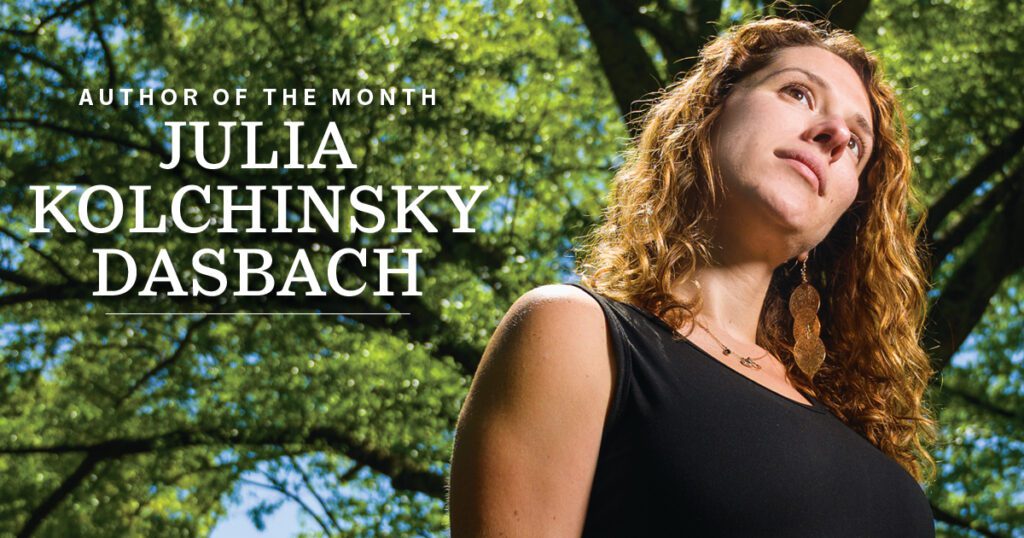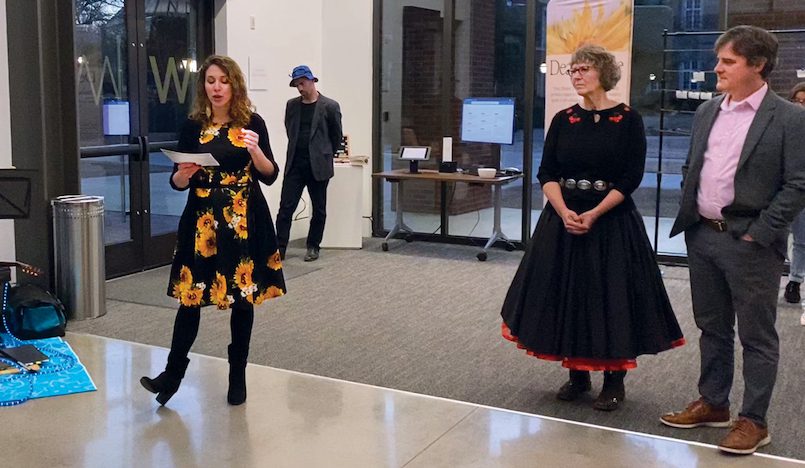02 May 2023 Author of the Month: Julia Kolchinsky Dasbach
By Susan Peterson
Julia Kolchinsky Dasbach was just 6 years old when she came to the U.S. in 1993 with her family, Jewish refugees from Dnipro, Ukraine. Life there was difficult. Antisemitism was severe and Soviet-era corruption remained rampant. Educational opportunities were sorely limited, and the state often determined your future.
Seeking a better future for their family, her parents gave up everything they had and emigrated to the U.S., relocating to Rockville, Maryland, a suburb of Washington, D.C.
Julia credits her parents for developing her love of poetry. When she was growing up, poetry and music were a daily part of her life. Poems were often memorized and recited, and she loved hearing the powerful, musical cadence of poetry in Russian. Under her parents’ tutelage, she memorized poems by Pushkin and other well-known poets.
When she was in the third grade in Rockville, Maryland, Julia’s teacher taught a poetry unit, and Julia was enthralled. Still building her skills in English, she asked, “How can I do that?” Her teacher gave her a simple, one-word response – write.

And she did. Language, literature and poetry became Julia’s main focus as she continued her studies. She earned a B.A. in English from the University of Maryland, an M.F.A. in poetry from the University of Oregon, and a Ph.D. in comparative literature and literary theory from the University of Pennsylvania.
Two years ago, she came to Hendrix College in Conway as a Murphy Visiting Fellow to teach poetry and settled with her family in Little Rock. She is the author of three poetry collections: “The Many Names for Mother” (2019), “Don’t Touch the Bones” (2020), and “40 WEEKS” (2023), which was just released in April from YesYes Books. Getting her first book published was a challenge. She received more than 100 rejections. “We don’t talk enough about rejections,” she said. During the five years it took her to find a publisher for her first book, she wrote two more. Both were immediately accepted for publication.
A theme in much of her work is the many injustices that run deep in her heritage. She felt the weight of this grief throughout her life, but most acutely when she spent three weeks in Poland as part of the Auschwitz Jewish Center’s fellowship. She was six months pregnant with her son while walking through the many death sites and concentration camps.
While there, she witnessed what she had been studying all her life – the many horrors her grandparents and great-grandparents endured. Her great-grandmother evacuated to the Ural Mountains while her great-grandfather remained in Kyiv. It is likely he died in Babyn Yar, the 1941 massacre of more than 33,000 Jews in the span of two days. Although she has searched, Julia has not been able to find his name in any archive that she has scoured. As she walked this terrain, she felt the connection between past, present and the future that her unborn son was being inscribed into.
Though her work delves into the traumatic history of family and nations, her writing about motherhood has a theme of expectancy for both the mother and child. The changes that occur, the many surprises, a new awareness of the world. Her newest book, “40 WEEKS,” is an unusual love story written for and about her unborn daughter, drawing comparisons or inspiration from the various seeds, fruits and vegetables that the size of the baby is compared to in-utero.
Although new to the 501 area, Julia has made an impact on both her students and the community. She knows words can unite. She is the founder and host of Words Together, Worlds Apart, a virtual poetry reading series “born out of pandemic but meant to outlast it.”

Julia’s poem “Dear Ukraine” was recently used as a prompt for a participatory installation in the lobby of Hendrix’s Windgate Museum of Art. Visitors composed their own poetry about the war in Ukraine, and their work was printed on-site and hung in the lobby. The display was supported by the Hendrix-Murphy Foundation and ran through March. But the writings, which can be translated into Ukrainian, Russian and Polish, remain online at dearukrainepoem.com. New poems are accepted on the site as well, and Julia invites readers to participate.
This spring, three of her poems were used as prompts for the Conway League of Artists Spring Show, where local artists used her poems to inspire their own works of art. She is a sought-after speaker, making appearances at Little Rock’s Holocaust Remembrance Day (Yom HaShoah), at Wednesday Night Poetry in Hot Springs (online during the height of COVID-19, and later in person), and most recently on April 29 at the Argenta Reading Series in North Little Rock.
Julia’s first two books have received awards. “The Many Names for Mother” was the winner of the Wick Poetry Prize and a finalist for the Jewish Book Award. “Don’t Touch the Bones” earned her the 2019 Idaho Poetry Prize. In addition to her poetry collections, Julia has been published in numerous magazines and periodicals.
Julia lives in Little Rock with her husband and two children, all of whom have inspired her work. Fortunately for Julia, but unfortunately for us in the 501, she recently accepted a tenure-track position at Denison University in Ohio starting this fall. We wish her all the best and are grateful to her for sharing her gifts with us, if only briefly.
As a writer, Julia knows the power of words. Through her work, she yearns to inform others, to help us remember, to encourage us to see a more beautiful world and be awed by life and its everyday surprises. Her books are available on Amazon and other online vendors, though she’d much rather you support local businesses and visit local bookstores to see if they can get her books. For more information about Julia, visit her website: JuliaKolchinskyDasbach.com.
- Author of the Month: Poet Sandy Longhorn - December 1, 2025
- Author of the Month: Latasha Davis - November 4, 2025
- Author of the Month: Jennifer Case - September 30, 2025










